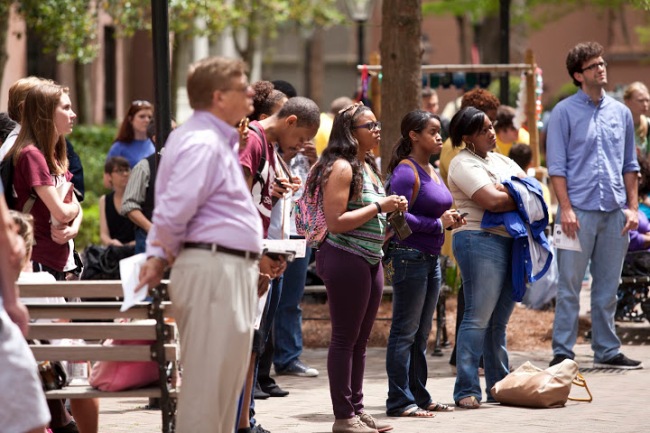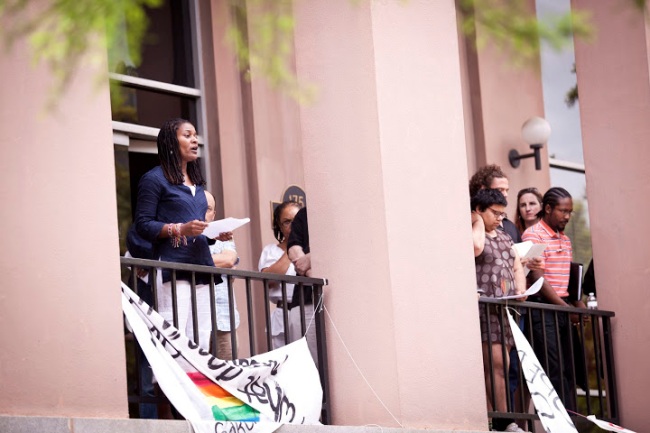The College of Charleston and the School of Education, Health, and Human Performance was proud to host a series of talks on the history of education and the black freedom struggle on February 20th and 21st, “The History of Education and the Black Freedom Struggle: Resistance, Desegregation, and the Continued Struggle for Quality Education.” The lecture series featured renowned historians Dr. James Anderson and Dr. Christopher Span of the University of Illinois at Urbana- Champaign. The lecture series addressed unfulfilled promises of the Brown v. Board of Education (1954) decision and the pressing demand for quality education and the continued need for continued educational reform in Charleston and across the country. This extended lecture series generated an important discussion about how the community can move forward in providing a quality education to all students.
Professor Christopher Span provided a thorough analysis of the achievement gap, the statistical differentiation in academic achievement between white students and students of color. His talk, “Addressing the Achievement Gap: Understanding Educational Inequality in American Education” also analyzed how the history of segregation continues to impact the quality of education in schools failing to meet the needs of all students. His analysis looked toward an intra-generational approach to understanding the achievement gap in an attempt to move away from the language of failure that stigmatizes many students of color.
Professor James Anderson addressed the role of Affirmative Action in educational policy at colleges and university in his talk, “Affirmative Action and the New Color Line: Fisher v. University of Texas and Public Discourse about Race in Educational Policy.” Anderson has served as an expert witness for the Supreme Court in the Michigan cases and shared his insights about why this policy is considered controversial and why it continues to be challenged today. His talk encouraged institutions like the College of Charleston to continue to promote diversity through institutional policy aimed at not only recruiting but retaining higher levels of enrollment among studnets of Color.
The series also included a panel discussion with some of the first students to desegregate Charleston area schools. Dr. Millicent Brown, Ms. Clarice-Hines-Lewis, and Ms, Oveta Glover spoke about their experiences desegregating Charleston Country School District in 1963, nine years after the Brown decision. Minerva King also spoke about her experiences as being the first plaintiff on the case that eventually desegregated the schools in Charleston. Mrs. Joann Howard and Mrs. Alifay Edwards recounted their experiences desegregating Mt. Pleasant area schools as well. Memories of the historic desegregation of South Carolina public schools illustrate both the promises and problems of civil rights era educational reform. In commemoration of the historic desegregation of public schools, Dr. Nancy McGinley, superintendent of the Charleston County School District, concluded the panel discussion by issuing a formal apology to the panelists. Dr. McGinley then read a proclamation from Mayor Joseph P. Riley declaring February 21st as “School Access Toward Equity Day.” The transcript of the apology and proclamation can be found below.
The discourse generated around issues of educational reform and continuing the movement to provide a quality education to all students continues today. The Charleston County School District is hosting the students who desegregated Charleston schools on April 12. The College of Charleston continues to engage in the important work of educational reform. Please contact Jon Hale for more information, halejn@cofc.edu (843)953-6354
Transcript of the Apology for Desegregation and the Proclamation of School Access Toward Equity Day, as read by Dr. Nancy McGinley, February 21, 2013:
“Thank you Dr. Howard and thank you to the College of Charleston for hosting this event. This event for me, and I’m sure for many of you, is both a wonderful and a sad event to attend and an emotional story to listen to. And in my nine years here in Charleston, six as superintendent, I have read many books about segregation. I have read the very, very painful school board transcripts. I have seen some of your pictures and I have been enormously saddened by the pictures that I saw of you walking into James Simmons for the first time, with your father I believe. The fear in your face, what courageous children you were, I am honored to meet you finally face to face. So today before I read the proclamation I want to say that this is a day of reconciliation, as they say in South Africa. And reconciliation begins with an apology. And on behalf of the Charleston County School District, I want to say, we were wrong, we discriminated against children, represented by these ladies here today. We treated you badly. We will do better. We must do better. But let give you something that you’ve waited 50 years for, and that’s a personal apology.
Whereas in the 1950s, the State of South Carolina constructed over 200 “separate but equal” schools for African Americans, also known as equalization schools, in anticipation of a judicial order from the Supreme Court to desegregate; and
Whereas, the State of South Carolina stalled and avoided the process of desegregation until 1963 despite the 1954 U.S. Supreme Court ruling to do so; and
Whereas in 1963, Millicent E. Brown, as chief plaintiff, and Cassandra Alexander, Eddie Alexander, Gerald Alexander, Ralph Dawson, Jacqueline Ford, Barbara Ford, Gale Ford, Oveta Glover, Clarisse Hines, and Valerie Wright, as co-plaintiffs in a case against Charleston County School Board District 20, were the first African American students to desegregate South Carolina’s public schools; and
Whereas 2013 marks the 50th anniversary of the pioneering act of these brave “first children”, many of whom have yet to be personally identified or publicly recognized, who courageously entered segregated schools alone or in small groups because the forces of history demanded that young African American children carry forth the struggle for a quality education; now
Therefore, I, Joseph P. Reily, Jr. Mayor of the City of Charleston do hereby proclaim February 21, 2013 as School Access Toward Equity Day.”
Filed under: Charleston, SC, Civil Rights Movement, Desegregation, Jubilee Project 
![]()



